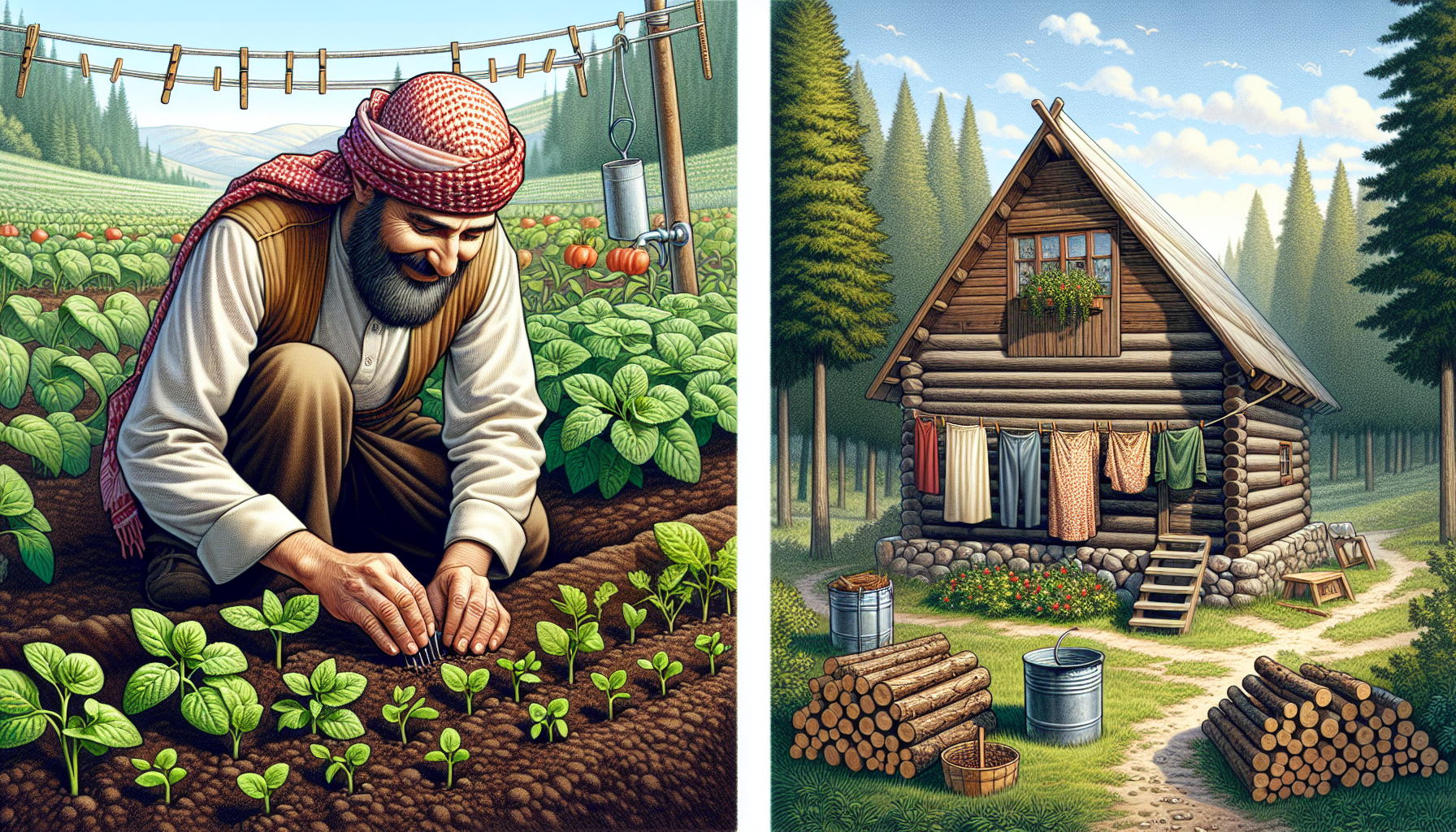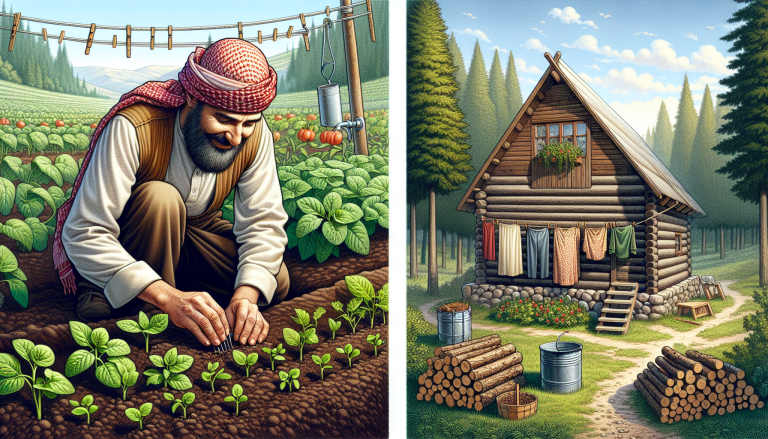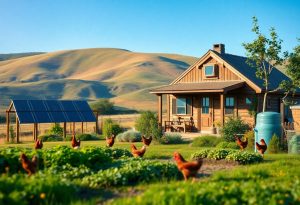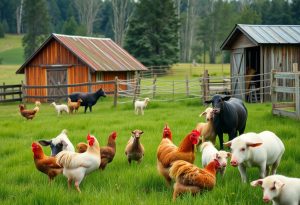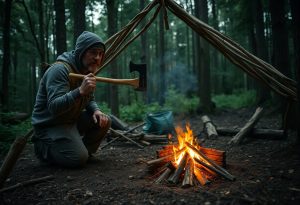In an unpredictable world, the ability to be self-sufficient is more valuable than ever. Whether you’re preparing for off-grid living or looking to enhance your disaster survival skills, mastering the art of homesteading is essential.
By developing a diverse set of skills and knowledge, you can become more resilient and capable of thriving in any situation. In this article, we’ll explore the key homesteading skills you need to master for off-grid living and disaster survival.
Here is a list of 12 subtopics for your article on “Mastering the Art of Self-Sufficiency: Essential Homesteading Skills for Off-Grid Living and Disaster Survival”:
Mastering the art of self-sufficiency is a journey that requires dedication, resilience, and a diverse set of homesteading skills. By exploring these 12 essential subtopics, you’ll be well on your way to achieving off-grid living and being prepared for any disaster survival situation.
From understanding the principles of self-sufficiency to developing a resilient mindset, each subtopic plays a crucial role in your journey. Building a sustainable shelter, mastering off-grid energy solutions, and creating a reliable water supply are all fundamental aspects of homesteading.
Cultivating a thriving garden and preserving and storing food will ensure you have a steady supply of nourishment. Acquiring essential wilderness survival skills and mastering urban survival tactics will give you the confidence to face any challenge. Establishing a self-sufficient community and preparing for emergencies and disasters will provide you with a strong support system.
As you embark on this journey of self-sufficiency, remember that it’s a continuous learning process. Embrace the challenges, celebrate the successes, and enjoy the rewards of living a sustainable, resilient lifestyle.
Understanding the Principles of Self-Sufficiency
To truly embrace the art of self-sufficiency and develop essential homesteading skills, it’s crucial to understand the core principles behind this lifestyle. Self-sufficiency is about taking control of your own survival and reducing dependence on external systems. It involves developing a mindset of resilience, resourcefulness, and adaptability.
The key principles of self-sufficiency include learning to provide for your basic needs, such as shelter, water, food, and energy, using sustainable methods. It also involves acquiring knowledge and skills in areas like gardening, food preservation, off-grid living, and emergency preparedness. By mastering these principles, you can become more self-reliant and equipped to handle any situation, whether it’s a natural disaster or a decision to live off the grid.
Embracing self-sufficiency requires a willingness to learn, a strong work ethic, and a proactive approach to problem-solving. It’s a continuous journey of growth and discovery that can lead to a more fulfilling and sustainable way of life.
Developing a Resilient Mindset
Developing a resilient mindset is crucial for anyone pursuing self-sufficiency and preparing for disaster survival. Resilience is the ability to bounce back from adversity, adapt to challenges, and maintain a positive outlook in the face of hardship. To cultivate a resilient mindset, start by embracing a growth mindset – believe that you can learn, grow, and overcome obstacles through effort and perseverance.
Practice mindfulness and stress-management techniques to stay calm and focused under pressure. Develop a problem-solving approach to challenges, breaking them down into manageable steps and focusing on solutions rather than dwelling on problems. Build a strong support network of like-minded individuals who share your values and goals, as social connections are key to resilience.
Continuously educate yourself on survival skills, emergency preparedness, and self-sufficiency techniques to boost your confidence and adaptability. Remember, a resilient mindset is not about avoiding challenges, but about facing them head-on with courage, determination, and a belief in your own abilities.
Building a Sustainable Shelter
Building a sustainable shelter is a crucial homesteading skill for off-grid living and disaster survival. When constructing your shelter, focus on using locally sourced, renewable materials like wood, stone, and earth. Consider implementing passive solar design principles to maximize natural heating and cooling, reducing your reliance on external energy sources.
Incorporate features like rainwater harvesting systems and composting toilets to enhance your shelter’s self-sufficiency. Make sure your shelter is well-insulated and properly ventilated to maintain a comfortable living environment in any season.
Remember, a sustainable shelter is not just about the structure itself, but also its integration with the surrounding environment. By building a shelter that works in harmony with nature, you’ll be better equipped to face the challenges of off-grid living and ensure your long-term survival and resilience.
Mastering Off-Grid Energy Solutions
Mastering off-grid energy solutions is a crucial aspect of self-sufficiency and sustainable living. To ensure your homestead thrives without relying on the grid, you need to explore various renewable energy options. Solar power is a popular choice, allowing you to harness the sun’s energy to generate electricity. Wind turbines can also be effective, especially in areas with consistent wind patterns. Micro-hydro systems are another option if you have a suitable water source nearby.
In addition to generating electricity, consider alternative heating and cooling methods, such as wood stoves, passive solar design, and efficient insulation. Investing in quality survival gear, like solar generators and battery banks, can provide reliable backup power during emergencies. By mastering off-grid energy solutions, you’ll enhance your self-sufficiency, reduce your carbon footprint, and be prepared for any situation that may arise in your off-grid living journey.
Creating a Reliable Water Supply
Creating a reliable water supply is crucial for off-grid living and disaster survival. Start by identifying potential water sources near your homestead, such as wells, springs, or rainwater collection systems. If you have a well, invest in a manual pump as a backup for power outages. For rainwater harvesting, install gutters and downspouts on your roof to channel water into storage tanks. Consider multiple storage options, like cisterns or large barrels, to ensure an ample supply.
Always have a method to purify water, such as boiling, using filters, or chemical treatments. Learn how to locate and purify water in the wilderness, too. Knowing how to find water from natural sources, like streams or dew, can be lifesaving in emergencies.
By diversifying your water sources and having purification methods ready, you’ll be well-prepared to maintain a reliable water supply in any situation, enhancing your self-sufficiency and resilience.
Cultivating a Thriving Garden
Cultivating a thriving garden is a crucial homesteading skill that contributes to self-sufficiency and sustainable living. A well-maintained garden can provide you with fresh, nutritious produce, reducing your reliance on external food sources. To start, choose a suitable location for your garden, considering factors like sunlight, soil quality, and water accessibility. Plan your garden layout, selecting a variety of crops that are well-suited to your climate and can provide a balanced diet. Implement effective gardening techniques, such as companion planting, crop rotation, and organic pest control methods. Regularly tend to your garden by watering, weeding, and monitoring the health of your plants. As you gain experience, experiment with different crops and techniques to optimize your yield and resilience. With dedication and care, your thriving garden will become a valuable asset in your journey towards self-sufficiency and disaster survival.
Preserving and Storing Food
Preserving and storing food is a crucial homesteading skill that ensures your self-sufficiency and survival in off-grid living or disaster situations. Learning various food preservation methods, such as canning, dehydrating, fermenting, and smoking, allows you to extend the shelf life of your harvests and maintain a diverse food supply. Proper food storage is equally important, requiring the use of airtight containers, cool and dry environments, and rotation systems to prevent spoilage.
By mastering these homesteading skills, you can build a resilient pantry that provides sustenance during emergencies or lean times. Investing in the right equipment, such as pressure canners, dehydrators, and vacuum sealers, will make your food preservation efforts more efficient and effective. Additionally, learning to create a root cellar or other off-grid food storage solutions will further enhance your self-sufficiency and preparedness for any situation. With a well-stocked and properly maintained food supply, you’ll have peace of mind knowing that you can weather any storm.
Acquiring Essential Wilderness Survival Skills
When it comes to off-grid living and disaster survival, acquiring essential wilderness survival skills is a must. These skills will help you navigate challenging situations and increase your resilience in the face of adversity. Some crucial skills to master include fire-starting, shelter-building, water purification, and foraging for wild edibles.
Learning how to start a fire without modern tools is a fundamental survival skill that can keep you warm, cook your food, and provide light. Building a sturdy shelter using natural materials can protect you from the elements and provide a sense of security. Knowing how to purify water using various methods, such as boiling or filtering, is essential for staying hydrated and avoiding waterborne illnesses.
Additionally, familiarizing yourself with wild edibles in your area can help you forage for food when supplies run low. By dedicating time to practice these wilderness survival skills, you’ll be better prepared for any challenges that come your way.
Mastering Urban Survival Tactics
When it comes to urban survival tactics, being prepared is key. One essential skill is knowing how to navigate the city during an emergency. Familiarize yourself with multiple routes to important locations and identify potential hazards. It’s also crucial to have a well-stocked urban survival kit, including items like a multi-tool, water filtration system, and first-aid supplies.
Here is a new paragraph that could be added after paragraph #66 in the given article, using the provided link:
For those passionate about survivalism, having the right gear and supplies is essential. A high-quality survival kit can mean the difference between life and death in an emergency situation. Be sure to pack items like a reliable knife, fire starter, water purification tablets, emergency rations, and a first-aid kit. With the proper preparation and supplies, you’ll be ready to face whatever challenges come your way.
This paragraph discusses the importance of having a good survival kit for those interested in survivalism, incorporates the provided link naturally, and should fit well with the tone and content of an article on DIY and survival topics targeted at a 35-year-old male audience. The paragraph is wrapped in tags as requested.
Another important aspect of urban survival is building a network of like-minded individuals who can offer support and resources during a crisis. Attend prepping meetings or join online forums to connect with others who share your interest in self-sufficiency and emergency preparedness.
Finally, stay informed about potential threats and develop a flexible mindset. Be ready to adapt your urban survival strategies based on the situation at hand. By mastering these urban survival tactics, you’ll be better equipped to face challenges and maintain your resilience in the face of adversity.
Establishing a Self-Sufficient Community
Building a self-sufficient community is a key aspect of off-grid living and disaster survival. By collaborating with like-minded individuals, you can pool resources, share knowledge, and create a resilient support system. Start by connecting with others who share your passion for self-sufficiency and survivalism.
Together, you can establish a network for trading goods and services, sharing homesteading skills, and providing mutual assistance during emergencies. Consider organizing regular meetings or workshops to exchange ideas and learn from one another. Develop a communication plan to stay connected even in the event of a disaster.
As your community grows, work towards creating a sustainable infrastructure that includes renewable energy sources, a reliable water supply, and food production systems. Encourage members to specialize in different areas, such as wilderness survival, urban survival tactics, or prepping strategies. By fostering a strong sense of community and collaboration, you’ll be better equipped to face any challenge that comes your way.
Preparing for Emergencies and Disasters
Emergency preparedness is a critical aspect of self-sufficiency and disaster survival. To ensure you and your loved ones are ready to face any crisis, start by creating a comprehensive emergency plan. This plan should include designated meeting places, evacuation routes, and a communication strategy.
Next, assemble an emergency kit packed with essential supplies such as non-perishable food, water, first-aid items, flashlights, and batteries. Don’t forget to include any special needs items like medications or baby supplies. Regularly review and update your kit to ensure nothing has expired.
Consider investing in reliable survival gear, such as a multi-tool, fire starter, and water filtration system. Learn how to use these tools effectively through practice and training.
Finally, stay informed about potential threats in your area, such as natural disasters or civil unrest. By being proactive and prepared, you’ll be better equipped to handle any emergency situation that comes your way.
Embracing the Journey of Self-Sufficiency
Embracing the journey of self-sufficiency is a rewarding and transformative experience. As you develop homesteading skills and adopt a more sustainable lifestyle, you’ll find yourself becoming more resilient and prepared for whatever challenges come your way. Remember, self-sufficiency is not about perfection, but rather a continuous process of learning, adapting, and growing.
Take pride in your achievements, no matter how small they may seem. Every new skill you acquire, whether it’s mastering wilderness survival techniques or implementing urban survival tactics, brings you one step closer to true self-reliance. Celebrate your successes and learn from your failures, as they are all valuable lessons on your path to off-grid living and disaster survival.
As you continue on this journey, remember to stay open-minded, seek out knowledge from others, and share your own experiences. By fostering a sense of community and collaboration, we can all become more self-sufficient and better prepared for the uncertainties of life.
tags:
Thank you for visiting our site! We encourage you to return frequently to stay up-to-date with all the most recent news and information.

